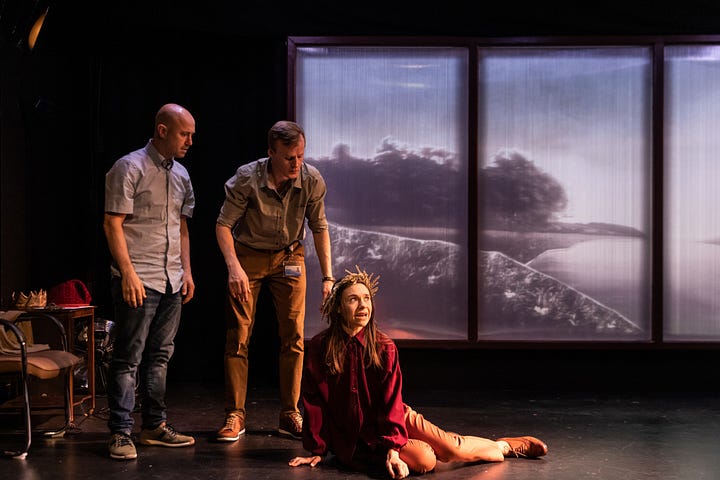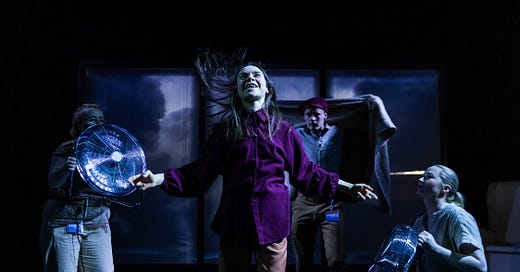Theatre review: Lost Lear at The Everyman
Dan Colley’s ‘Lost Lear’ is an expressionistic play of sorts, but one full of unconventional techniques writes Pádraig O’ Connor
For any individual, memory has the capacity to act as an entire reality on its own, but this reality is always a personal vision of the past that our minds can warp, edit and distort in ways that are not always easy to understand. The very act of remembering then, is entirely subjective and the truth it reveals cannot always be relied upon. In theatre, one very useful technique in emphasising this subjectivity is by means of expressionism, which aims at approaching the truth as closely as possible by expressing the inner, emotional experience of a character, rather than physical reality of the world they inhabit.
Dan Colley’s ‘Lost Lear’ is an expressionistic play of sorts, but one full of unconventional techniques. It is a story told from the point of view of Joy, a woman with dementia, who is living in an old memory of rehearsing Shakespeare’s ‘King Lear’. Joy, played by the excellent Venetia Bowe, resides in a care home and is being looked after by a carer called Liam (Manus Halligan) who employs ‘The Special Method’, a controversial approach to caring for people with dementia, which uses selected intact memories from the person’s pre-dementia past and links these to their present day activities.
Both Joy and her carer seem perfectly content to spend each day playing out this part over and over again, but they are disrupted by the visit of Joy’s estranged son Conor (Peter Daly), who wants to speak to his mother but finds the only way he can do so is by playing the part of Cordelia, King Lear’s daughter.
This is a very cleverly conceived theatrical device, and an interesting way of exploring the world of dementia, one which is full of in-jokes for thespians, such as Joy’s complaint that her son ought to be “off book” by their next day of rehearsing. But while the choice of ‘King Lear’ works very well in the sense that both Conor and Cordelia were disowned children and Lear was a character who asked his daughters to prove their love through words as opposed to action, in other ways it doesn’t quite match up, because as ‘Lost Lear’ progresses, it evolves by shifting the focus onto the son’s story and the effect of dementia on his interactions with his mother, as opposed to concentrating on Joy and the King’s tragedy.


Interestingly, ‘Lost Lear’ has far more in common with Tennesee Williams’ ‘The Glass Menagerie’ both in terms of style and characterisation, as the two plays feature a mother stuck in the past and a son who wants to be somewhere else. The influence of Williams’ play is however, most strikingly evident in the use of a scrim or see through curtain, a device used to depict an atmosphere of memory and unreality, whereby the audience can simultaneously see the inner world of Joy and the care home, but are also able to recognise the clear distinction between this private world of imagination and care, and the harsh outside world of reality and logic.
The setting of the care home, again in the expressionistic style, is very sparsely represented by a chair/throne for Joy to be seated on and a reception desk, which doubles as a control panel for the array of projections on the screen used as a backdrop behind the characters. The actors are allowed to move freely within this world and Bowe and Halligan are especially tremendous in their depictions of multiple characters. The costumes, though rather plain, are well put together, while the sound effects throughout are brilliantly designed by Kevin Gleeson.
One small issue however; even though the actors were mic’d up, some of the scenes reenacting excerpts from Lear were drowned out by the volume of the sound. This didn’t mean the audience lost track of the story, but maybe they might’ve found themselves zoning out a little in these parts.
All in all, this is quite an ambitious piece of work, by a talented director with clear strong personal ideas of what theatre has the potential to be. Colley has an array of many preferred techniques as to how best achieve this vision, as there is a large crossover in methods similarly used in his previous play ‘A Very Old Man with Enormous Wings’. But while many of the audience member’s were clearly affected by the show, at times it all felt a little too educational and didn't pack the emotional punch it could have. What it lacks in a clear and unique voice however, it makes up for visually and is well worth seeing as a spectacle alone.
Pádraig O’ Connor is a writer based in Cork.
‘Lost Lear’ finishes tonight (8pm) Wednesday, October 25 at The Everyman Theatre. It More dates and information about the national tour can be found here.
Theatre review: The Glass Menagerie at The Everyman
As the old saying goes, a mother is only as happy as her unhappiest child, but well, some mothers are only ever happy when forcing their children to live the life they think they ought to be leading. In Emma Jordan’s new prod…





